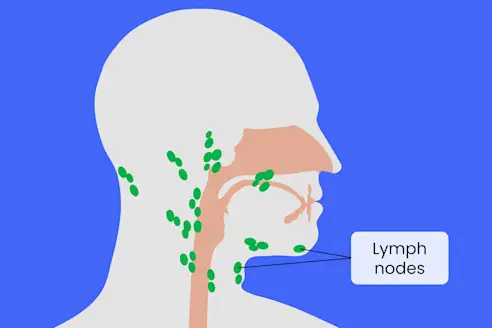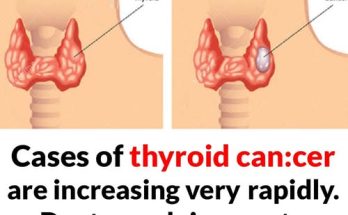
Discovering tender lumps in your neck, armpits, or other areas may be alarming, but it’s almost never a medical emergency. Here’s why they crop up, and what you can do about them.
After coming down with a cold or other illness, you’ve likely felt a lump on one or both sides of your neck that may or may not have felt tender to the touch. That lump, locate in what is called a lymph node or gland, was your body’s way of signaling that it was hard at work, fighting off whatever bug you caught. “Infection is the most common reason that you get swollen lymph nodes,” says Joshua Zeiger, M.D., assistant professor of otolaryngology and head and neck surgery at the Mount Sinai Icahn School of Medicine in New York City. “Any kind of upper respiratory infection can cause you to have these swollen lymph nodes in your neck.”
But infections aren’t the only cause of swollen lymph nodes, a.k.a., swollen glands, and the neck isn’t the only place they can crop up. In fact, these glands that are prone to swelling are positioned throughout your entire body. Learn more about their purpose, and what other conditions make them swell.
What Are Swollen Lymph Nodes?
Lymph nodes are bean-shaped glands. “They’re part of the lymphatic system, which is an important part of your immune system,” Dr. Zeiger says. “They help fight off bacterial and viral infections.” The lymphatic system is a network of fluid-filled channels that run throughout your body, per Cleveland Clinic. Your lymph nodes act like filters. They collect damaged cells, cancer cells, bacteria, and viruses from the lymph fluid and present them to immune cells that then fight them off.
When you get an infection, “the lymph node swells because you’re getting more [immune] cells in there replicating themselves and preparing an immune response,” says Patrick Jackson, M.D., an assistant professor in the Division of Infectious Diseases at the University of Virginia School of Medicine in Charlottesville, VA.
Where Are Lymph Nodes in Your Body?
The average adult has 800 of these glands, according to the National Library of Medicine (NLM). You’ll find them in places like your:
-
Armpits
-
Belly
-
Chest
-
Groin
-
Neck
Lymph nodes are more concentrated in certain parts of your body, like the sides of your neck, armpits, and groin, says Dr. Zeiger.
Symptoms of Swollen Lymph Nodes
When swollen glands are due to an infection, you might have other symptoms, too, say the experts at Mayo Clinic. These include:
-
Cough
-
Fever
-
Runny nose
-
Sore throat
Of course, which specific symptoms you’re dealing with depends on what infection is making your lymph nodes swell. Your doctor will ask about your symptoms and examine you to figure out the cause, says Dr. Zeiger.
What Do Swollen Lymph Nodes Feel Like?
It’s common to have some discomfort or pain in a swollen lymph node. “You can move the skin over the lymph node, and the lymph node will be a little bit tender to touch,” says Dr. Jackson.
Painless swelling is actually a bit more concerning. Sometimes a hard, painless lump could be a sign of cancer, such as leukemia, Hodgkin disease or non-Hodgkin lymphoma, according to Mount Sinai.
Common Causes of Swollen Lymph Nodes
An infection is the most likely reason for swollen lymph nodes, say our experts. And the everyday germs that cause colds and the flu aren’t the only bugs to blame. Per Mount Sinai, other common causes of swollen glands include:
-
Ear infections
-
Tonsillitis
-
Tooth infection
-
Sexually transmitted infections
Where you feel the swelling and pain depends on the cause. An upper respiratory infection will typically cause swollen glands in the neck, while some sexually transmitted infections cause swollen glands in the groin area, says Dr. Jackson.
Less Common Causes
In some cases, a problem with the immune system, such as the autoimmune disease rheumatoid arthritis (RA), causes lymph nodes to swell. Cancers like leukemia, Hodgkin lymphoma, and non-Hodgkin lymphoma are also a less likely but possible cause, per Mount Sinai. Other types of cancer such as head and neck or breast cancer can also spread through the lymph nodes. People can also get swollen glands as part of a reaction to a vaccine or medication.
Treatment will depend on what’s causing your swollen glands. While your doctor might prescribe an antibiotic or other medicine to treat an infection, an autoimmune disease or cancer will require longer-term treatment to manage.
At-Home Treatments
You don’t need to treat the swollen glands themselves—rather, they’re the signal that your body is fighting off the infection, says Dr. Jackson. Once the infection clears, they should shrink back to their normal size. “For the most part, you just have to wait it out,” he adds.
To make yourself more comfortable while you wait, “sometimes just using a warm compress can help ease the discomfort, in addition to taking over-the-counter pain medication,” Dr. Zeiger says.
While you can’t stop your lymph nodes from swelling up, you can prevent the infections that cause these eruptions in your neck and elsewhere in your body. “Make sure you’re up-to-date on your vaccines, practice good hand hygiene, and limit your exposure to upper respiratory infections,” suggests Dr. Zeiger. In other words, get your shots, wash your hands, and stay far away from anyone who’s coughing or sneezing.
Swollen lymph nodes usually aren’t cause for alarm. One exception is if they pop up quickly out of nowhere and you don’t have an obvious infection, says Dr. Zeiger. That could signal a more serious condition and warrants an appointment with your doctor.
Also watch for these warning symptoms, says Cleveland Clinic:
-
A fever that doesn’t go down
-
Lymph nodes that are hard, very painful, or not shrinking
-
Night sweats
-
Red or inflamed skin over the swollen lymph node
-
Swollen lymph nodes near your collarbone, elbow, or the bottom part of your neck
-
Trouble breathing
-
Weight loss
These could be signs of cancer, or a serious problem with your immune system such as HIV/AIDS. Again, don’t wait to make an appointment.
Most of the time, swollen glands are simply a sign that you’ve picked up a cold or other everyday infection that will get better on its own in a few days. But if the swelling doesn’t go down within two to four weeks, or it crops up suddenly or comes with other alarming symptoms, that’s when you need to call your doctor to investigate the cause, Dr. Zeiger says.



